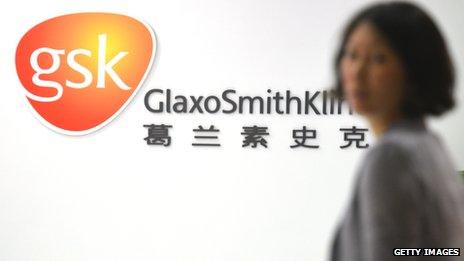GSK: In or out of China?
- Published
- comments

For most multinational companies, it is a no-brainer (to use the hideous corporate cliché) that they have to be big in China, if their global ambitions are to be taken seriously.
But at GlaxoSmithKline (GSK), executives are beginning to wonder whether the costs of being in the world's second biggest economy may soon outweigh the long-term growth prospects.
How so?
Well I have learned that there are two sources of concern for the giant British pharmaceutical company, and they both stem from the investigation by Chinese police into how travel agencies were allegedly used to channel up to £320m of bribes to doctors and officials.
The first problem is that GSK's sales of pharmaceuticals and vaccines in China - which were £750m last year - have been badly affected by the taint of the investigation.
I am told that GSK will soon have to evaluate whether the infrastructure of generating sales in China is affordable, if there is no assurance of a return to business as usual.
Perhaps more worrying for the company are the noises coming out of China on what the authorities there would want and need in order to draw a line under the affair.
In that context, a report earlier this week from the official Chinese news agency, Xinhua, was relevant and resonant.
Xinhua said: "It is becoming clear that it [the bribery] is organised by GSK China rather than... sales people's individual behaviour."
GSK accepts that individual employees may have behaved inappropriately in China, but it has consistently denied that they were acting on instructions from the company - and it continues to deny corporate involvement in the alleged wrongdoing.
So what it will not and cannot do, I am told, is accept corporate liability for the alleged bribery, as the price of reaching a settlement with the Chinese authorities and resuming normal trading there.
In part it cannot do this because it would then face the risk of having to pay enormous fines in the US and the UK, both of which have strict anti-bribery laws.
So the cost for GSK of refusing to plead guilty, as a company, may be a withdrawal from what many would see as the most important market in the world.